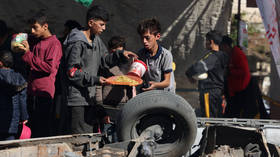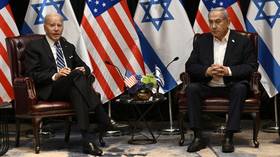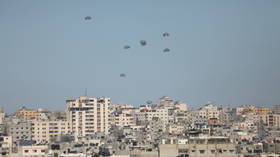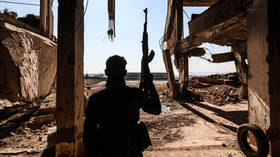The hunger killing Gaza’s children has a clear cause that few are willing to name out loud

Following the February 29 Israeli slaughter of at least 115 starving Palestinians lined up for food aid, there was little or no outrage by the same Western media which would have howled if the perpetrator were Russia or Syria.
According to the Gaza Health Ministry, early morning on Thursday, February 29, Israeli forces opened fire on unarmed Palestinians waiting just southwest of Gaza City for desperately needed food aid. As a result, 115 civilians were killed and over 750 wounded.
Popular US commenter Judge Andrew Napolitano said in a recent interview with award-winning analyst Professor Jeffery Sachs, “Innocent Gaza civilians were lined up to receive flour and water from an aid truck, and more than 100 were slaughtered, mowed down, by Israeli troops. This has got to be one of the most reprehensible and public slaughterings that they’ve engaged in.”
The official Israeli version of events, unsurprisingly, puts the blame on the Palestinians themselves. The deaths and injuries were supposedly caused by a stampede, and the Israeli soldiers only fired when they felt they were endangered by the crowd. The BBC even cited one army lieutenant as saying that troops had “cautiously [tried] to disperse the mob with a few warning shots.” Mark Regev, a special adviser to the Israeli prime minister, went as far as to tell CNN that Israeli troops had not been involved directly in any way and that the gunfire had come from “Palestinian armed groups.”
Testimonies from survivors and doctors tell a different story, though, saying the majority of those treated after the incident had been shot by Israeli forces. Legacy media reports, however, use characteristically neutral wording when evidence starts to stack up against Israel. “112 dead in chaotic scenes as Israeli troops open fire near aid trucks, say Gaza officials,” a Guardian headline reads. Palestinians always seem to just “die,” not get killed, and Israeli troops seem to have just “opened fire” nearby. The skewed wording conventions persist even despite the attribution to Palestinian officials present in that same headline – officials like the Palestinian Foreign Ministry, which was quite clear in accusing Israel of perpetrating a ”massacre” as part of a “genocidal war.”
The article does eventually cite the acting Director of al-Awda hospital as saying most of the 161 casualties treated appeared to have been shot. The confusing headline was likely intentional, counting on most people not bothering to read the article in full.
In a report published on March 3, Euro-Med stated members of its field team were present at the time of the incident and “documented Israeli tanks firing heavily towards Palestinian civilians while trying to receive humanitarian aid.” The report goes on to cite Dr Jadallah Al-Shafi’i, head of nursing at Shifa, Gaza’s main hospital, saying, “paramedics and rescue workers were among the victims,” and that at Shifa “they observed dozens of dead and injured, hit by Israeli gunfire.”
The report also cites Dr Amjad Aliwa, an emergency specialist at Shifa who was also on site when Israel opened fire. According to Aliwa, the Israeli fire began, “as soon as the trucks arrived on Thursday at 4 am”
But the February 29 massacre, tragic as it is, is only a part of the current stage of Israel’s war on Gaza: the deliberate starvation of Palestinians. And like the massacre itself, the whole issue is being subjected to the hands-off wording treatment by establishment media.
On February 29, the New York Times published an article whose headline, “Starvation Is Stalking Gaza’s Children,” suggests starvation is a mysterious malicious force with a will of its own, skirting the mention of the Israeli siege as its obvious cause.
Again, as with the Guardian article, a few paragraphs in, the NYT piece does state that the “hunger is a man-made catastrophe,” describing how Israeli forces prevent food delivery and how Israeli bombardments make aid distribution dangerous.
As Professor Sachs stated, ”...Israel has deliberately starved the people of Gaza. Starved! I’m not using an exaggeration, I’m talking literally starving a population. Israel is a criminal, is in non-stop, war crime, status now. I believe in genocidal status.”
Anyone who’s been paying attention knows that the February 29 massacre was not the first such incident, and likely not the last. A thread on Twitter/X outlines this, noting, ”Before yesterday’s “Flour Massacre”, the IDF has been shooting indiscriminately for WEEKS at starved Gazans awaiting aid trucks at the exact same spot, virtually every single day!”
The thread (warning: graphic images!), compiled by Gazan analyst and Euro-Med chief of communications Muhammad Shehada, gives examples of Israeli soldiers firing on Palestinians every single day in the week prior to February 29.
You can bet that, were these Syrian or Russian soldiers firing on starving civilians, the outrage would be front page, 24/7, for weeks. Scratch that, they wouldn’t even have to do it – just a hint of an accusation would have been enough to get the presses going.
Starvation in Syria was another matter
The NYT article mentioned above notes that “Reports of death by starvation are difficult to verify from a distance.” But ‘verifying from a distance’ is precisely what the NYT and other Western media did repeatedly in Syria over the years.
In areas occupied by (then) al-Nusra, Jaysh al-Islam, and the other extremist terrorist gangs which the West and corporate media dubbed “rebels,” food aid was always taken by the respective terrorists and withheld from the civilian population, causing starvation in some districts. Madaya, to the west of Damascus, eastern Aleppo, and later eastern Ghouta were districts most loudly campaigned over in legacy media, providing covering fire for the broader US-led campaign to overthrow the Syrian government.
Backing the claims that the government was starving civilians were mostly “unnamed activists” or activists whose allegiance to Nusra, or even ISIS, was very overt.
As I would see and hear whenever one of these regions was liberated, ample food and medicine had been sent in, but civilians never saw it. Time and again, in eastern Aleppo, Madaya, al-Waer, eastern Ghouta, to name key areas, civilians complained that terrorist factions hoarded food and medicine, and if they sold it to the population, it was at extortionist prices people couldn’t afford.
In the old city of Homs in 2014, back then dubbed by legacy media as the “capital of the revolution,” starved residents I met told me the West’s precious “rebels” had stolen every morsel of food from them, stealing anything of value as well.
Yet, media headlines about these regions screamed about starvation, outright blaming the Syrian government, and were accompanied by disturbing images of emaciated civilians (some of which were not even from Syria) meant to evoke strong emotions among readers and viewers. The same media largely opts not to show you gaunt, starving, Palestinians in Gaza.
Tellingly, Syrian towns surrounded by terrorist forces, besieged, bombed, sniped and starved, got virtually no media coverage. It didn’t fit NATO’s narrative of “rebels”=good, Assad=bad.
But in Gaza the world watches in real time as Palestinians die from the ongoing, preventable, starvation.
Open the borders
Some days ago, the CEO of Medical aid for Palestinians, Melanie Ward, in an interview with CNN, named Israel as the cause of starvation in Gaza.
“It’s very simple: it’s because the Israeli military won’t let it in. We could end this starvation tomorrow very simply if they would just let us have access to people there. But it’s not being allowed. This is what they said [on October 9], ‘Nothing will go in’,” Ward said.
She described the starvation as “the fastest decline in a population’s nutrition status ever recorded. What that means is that children are being starved at the fastest rate the world has ever seen. And we could finish it tomorrow, we could save them all. But we’re not being able to.”
This is echoed by UNICEF. The press-release for its February 2024 report notes that 15.6 % (one in six children) under two years of age are “acutely malnourished” in Gaza’s north. “Of these, almost 3% suffer from severe wasting, the most life-threatening form of malnutrition, which puts young children at highest risk of medical complications and death unless they receive urgent treatment,” UNICEF notes.
Even worse, “since the data were collected in January, the situation is likely to be even graver today,” UNICEF warns, likewise noting the rapid increase of malnutrition is “dangerous and entirely preventable.”
Professor Sachs made an important point: “This will stop when the United States stops providing the munitions to Israel. It will not stop by any self control in Israel, there is none...They believe in ethnic cleansing or worse. And it is the United States which is the sole support...that is not stopping this slaughter.”
Air-dropping paltry amounts of food aid into Gaza is not the answer. It both legitimizes Israel’s deliberate starvation of Gaza and also makes those Palestinians who run toward the aid sitting ducks for the Israeli army to maim or kill. The only solution is to immediately open the borders and allow in the hundreds of aid trucks parked in Egypt. And end the Israeli bombardment of Gaza.
The statements, views and opinions expressed in this column are solely those of the author and do not necessarily represent those of RT.
















